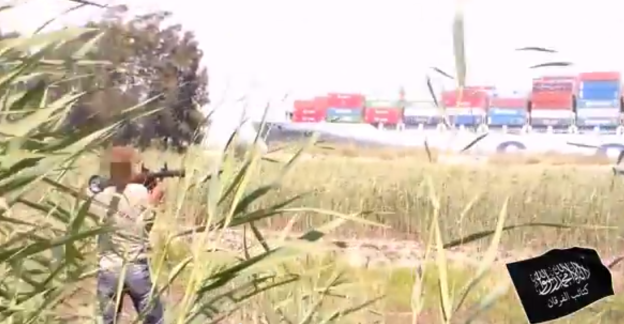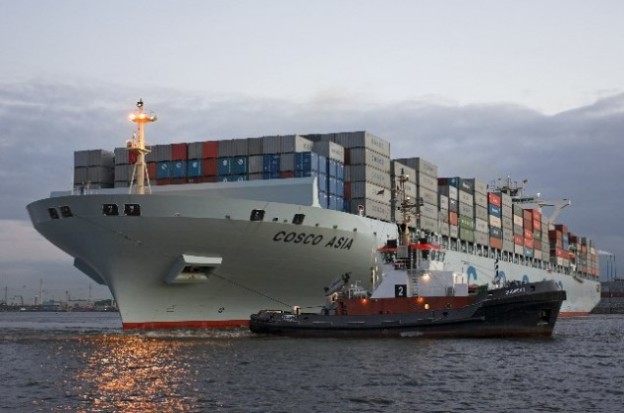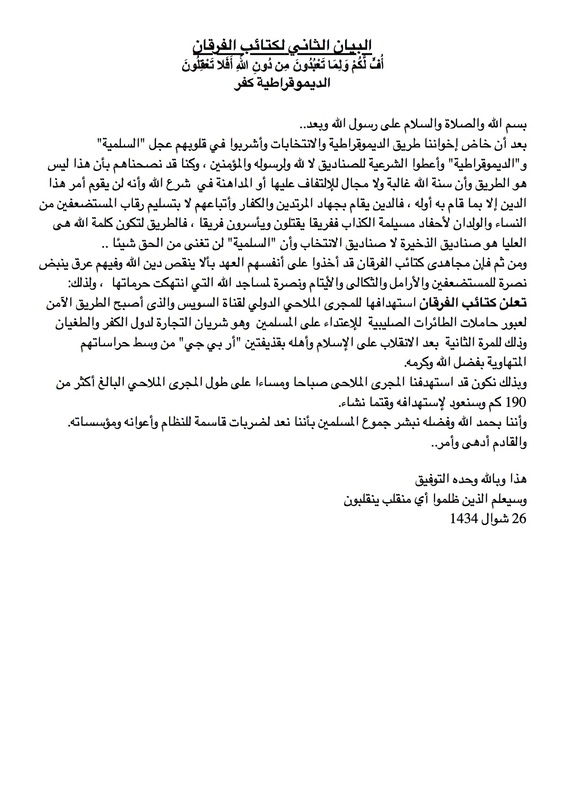
An Islamist terror group has taken responsibility for a Saturday rocket propelled grenade (RPG) attack on a merchant ship transiting the Suez Canal, USNI News has learned.
A video posted on YouTube Wednesday — alleged to have been issued by the group Al-Furqan along with a letter of responsibility — show two men with rocket propelled grenades fire at least one RPG round into the side of a cargo ship bearing the markings of the Chinese merchant shipper Cosco.
Previous press reports said the ship in the Saturday incident was the Panamanian flagged cargo ship, Cosco Asia.
The Wednesday letter — according to a rough translation provided to USNI News by industry sources — said the group supported the Muslim Brotherhood in Egypt, called for an end to democracy and promised future more severe action against ships in the Suez canal.
The group claimed it was, “targeting the international shipping waterway which has become a safe route for crusader aircraft carriers travelling to attack Muslims, and a trade artery for infidel and tyrannical states,” in a separate translation in a Thursday report from news service Ahram Online.
The video and the accompanying letter from Al-Furqan claiming credit for the attack gives further credence to claims the Suez Canal Authority (SCA) made on Saturday of a terrorist attack that were quickly walked back by the Egyptian military.
“We spoke with the designated person from Cosco in [Port] Said,” Kevin Doherty with maritime security consultancy Nexus Consulting Group told USNI News on Thursday.
“The shipping company’s general manager relayed to us that the master told them he had been hit with a rocket. That was consistent with the SCA report.”

The claim from the SCA and other independent reports on the incident give further credence to the video.
“We think it was an attack from a small rocket or something like that,” Cosco’s managing director for Egyptian operations told International Oil Daily on Sept. 2.
“When it reached the front deck of the vessel, it blasted and made a big explosion sound.”
Following the initial reports, Cosco has remained silent on the attack.
“Due to the only very small damage to the deck and boxes and no [casualties] on board, we don’t want to openly discuss this matter,” company officials said in a Monday email obtained by USNI News.
Both the initial SCA alert and early reports from Cosco officials run counter to claims from the Egyptian military that downplayed the incident.
Egyptian military sources quoted by news service Reuters said three suspects had been arrested and had used pistols or machine guns — not RPGs.
“The Egyptian government is saying we arrested these guys, its over,” Doherty said.
“Clearly they didn’t. They were able to upload their video. They were able to fire two rockets at a ship and they intend to sink a vessel. They haven’t accomplished their mission and they have not been arrested.”
Doherty — a former U.S. Marine — said the name Al-Furqan comes from the Koran that roughly translates to “patriot” and was a name used by an insurgent group in Iraq.
“We think it’s a new group that has adopted the same name,” he said.
In reaction to the video, Nexus issued a “severe warning” to ships attempting to transit the canal and urged shippers to use the “utmost vigilance.”
The Egyptian military and shipping insurers — mostly based in the U.K. — have an incentive to downplay incidents in the Suez.
Egypt takes in $5 billion annually in fees from shippers using the canal and is the number one revenue stream for the country — all the more important since tourism has fallen off due to the current unrest in the region.
Insurers have an incentive not to raise transit rates for shippers.
Previous rate increases due to piracy in the Straits of Malacca caused pushback from shippers and countries in that region of Asia, Michael Frodl, head of U.S. consultancy C-Level Maritime Risks told USNI News on Thursday.
“This has to be a very deliberate judgment call on [the insurers] part. Because the Suez Canal doesn’t have a practical workaround,” Frodl said.
“Once they raise the rates the cost will be passed along.”
There are few other routes to connect ships from the Atlantic to the Pacific if the Suez transit becomes too dangerous or unaffordable. Routes around the Cape of Good Hope at the southern tip of Africa can dramatically increase fuel costs for shippers that already operate with small margins. Arctic routes are too untested and too far away from search and rescue assets in case shippers get into trouble.
So far, maritime insurers aren’t reacting to the emergence of the video, according to a Thursday report from the Oil Price Information Service that quoted the Lloyd’s Marketing Association head of underwriting, Neil Smith.
“We have looked at [the video],” Smith told OPIS.
“And it is something we won’t be taking any action over at this stage.”
It’s unclear now if the U.S. or other nations will issue warnings to shippers based on the terrorist claims.
The aircraft carrier USS Nimitz (CVN-68), its escort of three Arleigh Burke guided missile destroyers and one Ticonderoga guided missile cruiser have been tasked to the Red Sea in case they are needed to support a limited strike on Syria. In order to support forces in the Eastern Mediterranean, the ships would likely transit through the Suez.
Last week the amphibious warship USS San Antonio (LPD-17) transited through the canal without incident.






